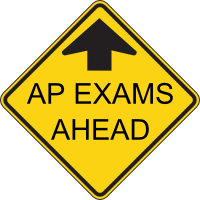
Now that you have received your first scored AP essay back, you might be thinking about ways to improve your writing–especially if you’d like to get into the 7Up club. Completing an AP prompt can be challenging, even for students who are confident writers. Although AP officially stands for Advanced Placement, it’s also telling you the key to success:
AP = Answer the Prompt
The number one thing separating a top scoring AP essay from one that doesn’t get the job done is whether the student has carefully considered and addressed all parts of the prompt. Here are some things to consider when you sit down to write.
DO
• Be thorough. Make sure you have identified everything the prompt is asking you to do. Doing a brilliant job of identifying the literary devices in a prose passage or poem is great, but if you never show how they are working in the piece to reveal the theme (or whatever the prompt is asking you to comment on), then your essay won’t rise much higher than a 5.
• Be specific. Quote from the poem or passage to support your points; don’t generalize. Embed the quotations smoothly within your analysis rather than copying chunks and dropping them into the text for the reader to make the connection. Refer to specific events, conversations, and characters in your selected novel or play for Q3.
• Be generous. One example, no matter how sparkling, is ever enough. To move from “plausible” (6-7) to “persuasive” (8-9), you have to provide plentiful support for your ideas. That means tracing an idea throughout an entire larger work instead of mentioning just one key scene, or connecting the images in every stanza of a poem, not just the most vivid one in the final couplet.
• Be aware. Consider your audience. These people are experienced teachers and professors. They’re also avid and careful readers. Pitch your essay at a level they expect. Employ formal language. Use present tense when writing a cricial discussion of a piece of literature. Leave yourself out of it; keep the focus on the work itself, not what you think, like, or dislike about it.
• Be yourself. The very best essays are always a combination of excellent analysis and a strong, unique voice. Yes, a formulaic five-paragraph essay from a three-part thesis will get the job done, but when it comes to AP, style points are crucial. Now is the time to show off your fabulous vocabulary or your interesting insight. Remember, the full name of the course is AP Literature and Composition. Include the niceties of writing that can help your essay sing.
DON’T
• Summarize. The last three words of the Q3 prompt are always “Avoid plot summary.” Your job is not to explain to the reader what happens in the novel or what occurred next in the play. The reader is assuming that you, as an AP student, have read the work and “get it.” You should assume the same about the reader. The college professor who wrote a dissertation about Shakespeare is not going to appreciate (and doesn’t need) the two paragraphs you just wasted explaining what happens in Othello.
• Parrot the prompt. Your thesis statement should reflect your thinking about what the prompt is asking, not incorporate the wording in the prompt itself. The more copying you’re doing, the less thinking.
• Regress. Signal phrases like “In conclusion” or openers like “Webster’s defines X as…” reveal a lack of confidence in your ability to structure and present original, quality writing. These are training wheels from elementary school. Leave them in the past where they belong. Check out the Verboten list for other phrases to avoid.
• Cheerlead. Your job is not to convince the reader of the writer’s brilliance or how the passage reflects humanity, literature, or writing in general. Stay away from statements about the nature of society and phrases like “Great writers often…” “Authors often use…” or “We as humans…”
• Dump. Pointing out a metaphor, symbol, or other literary device to the reader without analyzing further is like a cat dropping its dead mouse offering on the doorstep. It’s not enough to identify that a writer or poet is employing a particular device. You have to connect the use of the device with the MOWAW (meaning of the work as a whole). The same is true for examples and support in Q3. Mentioning the use of winter imagery in a poem is one thing. Explaining how those images enhance the sense of isolation expressed by the speaker is something else entirely.
• Panic. The reader is well aware of the time constraints you are working under. Plan your essay and execute it to the best of your ability in the time you have available. Read carefully (you can do that). Annotate as you go (you may not like it, but you can do that as well). Create a structure for your essay. Get started. If you’re stuck on an introduction, start with a body paragraph and circle back to write the introductory paragraph later, once you have a firmer grasp on the scope of your essay. Include specific examples that reinforce your thesis throughout. As Teddy Roosevelt said, “Do what you can with what you have where you are.”
Happy writing!
Adapted from material by Jane Gutherman, AP Literature instructor at Dr. Phillips HS.
 Now that we have completed the marking period, it is time to reflect on your performance as a student in English IV Honors. For this assignment, you will need to review the information in your class portfolio in addition to the writing assignments you have submitted to Edmodo. Your reflection should be thoughtfully written in complete sentences–no bullet points! Be sure to include all three areas in your review.
Now that we have completed the marking period, it is time to reflect on your performance as a student in English IV Honors. For this assignment, you will need to review the information in your class portfolio in addition to the writing assignments you have submitted to Edmodo. Your reflection should be thoughtfully written in complete sentences–no bullet points! Be sure to include all three areas in your review.

